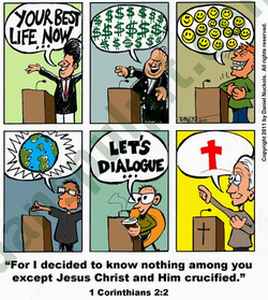This year, I found myself spending some time reflecting on the two thieves who were crucified alongside of Jesus. We find the story in Luke 23:32-43.
Two other men, both criminals, were also led out with him to be executed. When they came to the place called the Skull, they crucified him there, along with the criminals—one on his right, the other on his left. Jesus said, “Father, forgive them, for they do not know what they are doing.” And they divided up his clothes by casting lots.In particular, I was contemplating how the one thief came to recognize Jesus as the Messiah. It was certainly not due to physical appearances. Here was Jesus, beaten and bloody, barely recognizable as a man, much less as a god, being executed as a common criminal. Those who insist that baptism and good works are necessary for salvation contend that the thief had become a believer and was baptized sometime in the past. They argue for this scenario based solely upon the fact that the Bible does not specifically deny this. This argument from silence however, is most unlikely since the meticulous author Luke would likely have mentioned such an important detail. In addition, the thief himself never even hints at this and offers not only an appeal, but a confession of faith as well. The only plausible explanation for the thief’s confession is the divine illumination and power of the Holy Spirit.The people stood watching, and the rulers even sneered at him. They said, “He saved others; let him save himself if he is God’s Messiah, the Chosen One.” The soldiers also came up and mocked him. They offered him wine vinegar and said, “If you are the king of the Jews, save yourself.” There was a written notice above him, which read: THIS IS THE KING OF THE JEWS.
One of the criminals who hung there hurled insults at him: “Aren’t you the Messiah? Save yourself and us!” But the other criminal rebuked him. “Don’t you fear God,” he said, “since you are under the same sentence? We are punished justly, for we are getting what our deeds deserve. But this man has done nothing wrong.”
Then he said, “Jesus, remember me when you come into your kingdom.” Jesus answered him, “Truly I tell you, today you will be with me in paradise.”
 This should be a lesson for us today. A major objective in many of our modern market driven churches is to increase their membership roles. The salvation of those who join is often optional. Numerous churches however, are honestly seeking to save the lost. Many spend major bucks with marketing consultants in their quest to attract perspective members. While we should be looking at various means of attracting people to church, I’d like to offer my best advise free of charge: Preach the Gospel and rely on the power of the Holy Spirit. I’m convinced that this method will not only result in increased membership, but also accomplish the more important goal of leading others to salvation in Christ.
This should be a lesson for us today. A major objective in many of our modern market driven churches is to increase their membership roles. The salvation of those who join is often optional. Numerous churches however, are honestly seeking to save the lost. Many spend major bucks with marketing consultants in their quest to attract perspective members. While we should be looking at various means of attracting people to church, I’d like to offer my best advise free of charge: Preach the Gospel and rely on the power of the Holy Spirit. I’m convinced that this method will not only result in increased membership, but also accomplish the more important goal of leading others to salvation in Christ.
The Apostle Paul wrote in his letter to the Romans that I am not ashamed of the gospel, because it is the power of God that brings salvation to everyone who believe…(Rom 1:16). I don’t know if many modern churches are ashamed of the Gospel or have just lost faith in its power. Some believe it to be old-fashioned, simplistic and out-of-date. It is thought that, if we are to reach people these days, we must be more relevant to our modern sophisticated culture. Yet, we would be hard pressed to find a more simplistic and basic message than the one offered over and over by Billy Graham. Furthermore, we can readily see the results.
I recall a story from few decades back, when Billy was already seeing hundreds and thousands come to Christ with each crusade. One evening, he preached what he thought to be his best sermon yet, but it produced little results. Afterward, he was approached by one of his staff who asked him why he failed to mention the cross in his sermon. Billy initially got angry, thinking “who is he to tell me how to preach?” Later in his hotel room, Billy came to the realization that the staffer was right, and resolved never to preach again without mentioning the cross.
Now, compare Mr Graham’s method with that in many of our modern churches. After ignoring the Gospel during the sermon, the church then resorts to “easy” techniques during the “invitation”. After being careful to not offend anyone by mentioning the fact that we are sinners (the very reason that we need a Savior), visitors are told they can accept Jesus and join the church by “coming down to the front”, or “if you too embarrassed to walk to the front, just slip out to one of our ushers along the back or sides, or if this is too much, simply lift up your hand and we’ll contact you”. What’s next, installing moving sidewalks like we find in airports?
We find another familiar story in Luke 18:35-43.
As Jesus approached Jericho, a blind man was sitting by the roadside begging. When he heard the crowd going by, he asked what was happening. They told him, “Jesus of Nazareth is passing by.”We thus see a beggar crying out to Jesus (“Son of David” is a recognition of Jesus as the promised Messiah). The surrounding crowd admonished him to be quiet. We can just imagine the comments, “stop making a scene”, “you’re embarrassing yourself”, “have some dignity” etc, but recognizing his own helplessness, he shouted even louder until Jesus healed him both physically and spiritually.He called out, “Jesus, Son of David, have mercy on me!” Those who led the way rebuked him and told him to be quiet, but he shouted all the more, “Son of David, have mercy on me!”
Jesus stopped and ordered the man to be brought to him. When he came near, Jesus asked him, “What do you want me to do for you?”
“Lord, I want to see,” he replied. Jesus said to him, “Receive your sight; your faith has healed you.” Immediately he received his sight and followed Jesus, praising God. When all the people saw it, they also praised God.
Those who understand will recognize that we’re all like that beggar. Adrian Rogers used to say that witnessing was simply one beggar showing another beggar where to find food. Notice also that the beggar didn’t have to be humanly persuaded to come to Christ. In fact, those surrounding him were actually discouraging him from calling out to Jesus. So, when the Holy Spirit truly regenerates a person, surrounding hardships won’t be able to keep them from Jesus. In many countries, there are people coming to Jesus despite being threatened by death.
I’m certainly not saying we should discourage or make it more difficult in our churches for people to come to Christ, or that we shouldn’t explore various means of attracting perspective members, but these techniques should be supplementary to, rather than a substitute for the Gospel. We must first and foremost preach the truth and allow the Holy Spirit to work. I’m convinced that, as people realize their true state and are persuaded by the power of the Spirit, we could string barbed wire across the aisles and many would still find a way to Jesus.
Notes:
We are saved by placing our faith and trust in Jesus as Savior and Lord. Making a public profession by walking to the front and/or joining a church is a step of obedience, but is not the basis of our salvation.
I’m also not saying that churches should merely go through the “Roman Road” each week. This article only addresses the evangelistic function of the church. Members must also be discipled by a balanced teaching of the other historical doctrines of the faith. We'll take up this topic in future articles.
The illustration is courtesy of the very talented Dan Nuckols of Dan’s Pulpit.

No comments:
Post a Comment
We welcome your insightful opinions, but please keep them suitable for family viewing. If you are not logged in, you may post with just your name or nickname by selecting "Name/URL" and leaving the URL field blank. Thank you for your input.